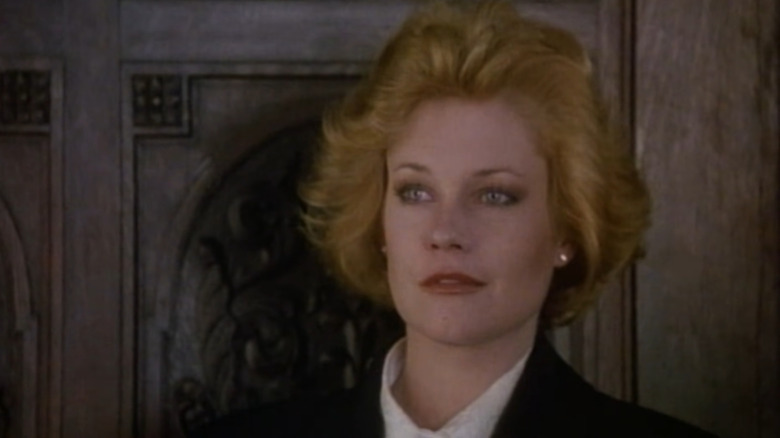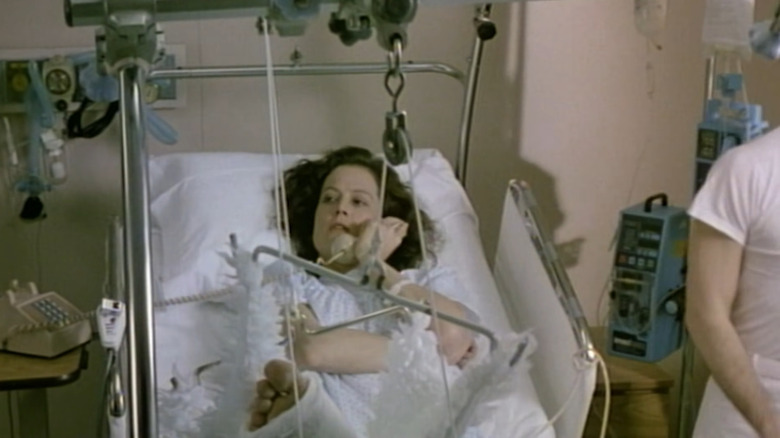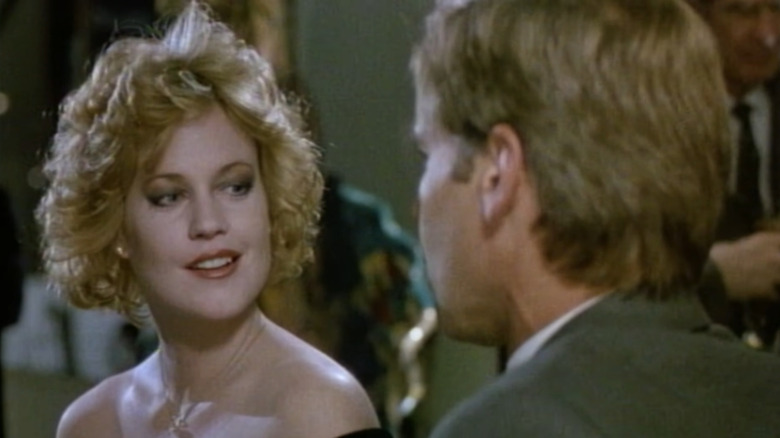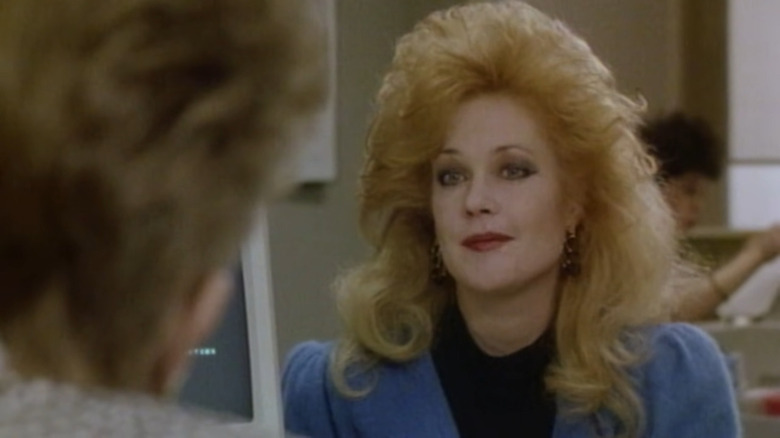What Selena Gomez's Working Girl Reboot Needs To Do To Be Relevant For The Here And Now
Get out the hairspray and shoulder pads: 20th Century Studios is developing a new version of the 1988 film "Working Girl." The project reportedly has "Only Murders in the Building" star and executive producer Selena Gomez in final negotiations to produce the film, with Ilana Peña ("Diary of a Future President") adapting the script. The site doesn't say if Gomez would star in the role made famous by Melanie Griffith, though she would be a great choice, with a very different feel than Griffith had. And a different feel is certainly called for with a new take on this film.
"Working Girl" was nominated for six Academy Awards, and considered a feminist film — for its time. Griffith's Tess is a secretary who has been treated terribly by her male bosses and her terrible boyfriend, Mick (Alec Baldwin). When she gets a new job working for a woman, Tess thinks her luck has changed. But Sigourney Weaver plays her superior Katharine, who is the very epitome of the '80s woman boss trope; she only cares about power, has a huge ego, and treats other women in business like garbage while pretending to be nice. Tess comes to her with a brilliant idea for their company, but Katharine shoots it down.
When Katharine breaks her leg, she asks Tess to house-sit. Tess does some snooping and realizes that Katharine was going to take her idea and pass it off as her own. So she poses as a person in Katharine's position, takes meetings, unwittingly starts a relationship with Katharine's boyfriend Jack (Harrison Ford), and eventually, the merger idea is revealed to be hers. At her new job, Tess vows to be the type of female boss she never had and work with her own secretary as a partner.
A very white film
Of course that felt feminist at the time. There's a high-powered female boss, a young upstart who is clever enough to pull off a scheme like this, and, of course, she got the job and the guy. For a lot of women, it felt validating to see what they went through in terms of harassment or lowered expectations in the workplace portrayed on the big screen. However, feminism has changed a lot since 1988, and a reboot of the film would have to make some changes to actually work in the modern day.
Let's start by mentioning how very white this film is. Make all the arguments you want about this title being a product of its time, but that type of casting is not going to fly now, nor should it. The career struggles for women and other genders and people of color should absolutely be addressed here.
We also have to take on what was acceptable (if gross) behavior then versus now. For instance, it was far more common to ask someone who worked as a secretary to do personal chores like dry cleaning or, as we see in the film, house-sitting. Katharine was doing what a whole lot of male bosses did back then, which was look at a woman who worked in a lower position in the company, and assume it was okay to ask them to do menial chores. If the secretary was a man, it would have been unlikely. It wasn't okay back then, either, but people got away with it because of that tired old argument about how they're "a product of the times."
Breaking stereotypes
"Working Girl" played on stereotypes. The ditzy blond (sigh) who was really smarter than she seemed. The fact that, if you encountered a woman who had risen high in her field, she must be a scheming bitch. Or the sort of halo that Tess gets, both for putting up with the harassment she got at her old job from men, and they way she has to be underhanded to get what she wants, rather than calling those things out.
To be fair, before the #MeToo and #TimesUp movements, women did have to deal with things differently. Early in my career, if you complained about such things, you were "difficult to work with," or "no fun," or "causing trouble when you should just toughen up and take it." These are direct quotes. Those movements haven't fixed everything, of course, but they have changed what is acceptable behavior in some workplaces. There are some things a modern version of Tess wouldn't have to put up with in the same way she did in the 1988 film. At least not for long.
"Working Girl" used the unicorn trope as well. You know, the one where a woman is "one of the guys" but is also sexy, and very different from "other women." It's the whole, "I belong here because I can hang with the guys, and when another women comes in, I have to take her down" idea that we see with Katharine. There are certainly women, men, people of every gender who are awful to colleagues and underlings, and we don't have to pretend otherwise, but that particular trope is tired.
Sexuality as currency
In the 1988 film, Tess lies about who she is, gets involved with her boss's boyfriend (but it's okay because they were about to break up, I guess?), and uses the line, "I have a head for business and a bod for sin."
That's all very rom-com, and it won't bother a lot of people, but even going over the plot again and remembering when I watched this last, it's clear exactly how sexualized Tess was. There is a difference between sexuality and sexualization, and it never felt like Tess was the one in control here. It's also worth noting that the signal that Jack was a good guy was the fact that, after getting her blackout drunk, he doesn't sleep with her. The symbolic code for good guy behavior really could use an expansion.
It also becomes a plot point when Jack defends Tess's work ... since they're together. That's sort of the icing on the cake of her win, but it shouldn't need to be. Tess doesn't need to be vouched for by a man, particularly one she's romantically involved with. The more romantic gesture, in my mind, would be letting her work speak for itself.
Sympathy for the devil
Tess doesn't make it through a rewatch as a shining example of what to do, either. She changes who she is, rather than using her strengths. She uses her boss's house to hook up with Katharine's boyfriend, and steals Katharine's clothes and her position to get ahead. It's hard to imagine a scenario in which this makes her look like a hero. Not that every star of a film has to have no flaws — far from it. But this is an area where a new version could provide some more complexity to the characterization.
Meanwhile, Katharine comes off as a terrible person in the original movie, but nowhere in that film do we see why that might be. There was no sympathy or even understanding in that film about what Katharine would have had to deal with to get where she was in her career. What about the harassment she suffered? This is not to say that she can't be a villain or a complete jerk, or that no one can call her on it, but one of the things many women have worked for over the decades since this film is the idea of building support for each other — or at least having some understanding of their struggles. It's something to think about in terms of where this new story goes.
Whoever ends up playing these roles, whatever we finally see in the new take, it would be lovely to see this addressed. Also, Selena Gomez — if she stars as well as produces — would likely provide a very different take on Tess (or Katharine, for that matter), and I eagerly anticipate seeing how she fills those shoes. But even if she doesn't end up starring and just serves as a producer, we're very curious as to how a new version of "Working Girl" redraws the cultural lines for what's acceptable in 2022.




